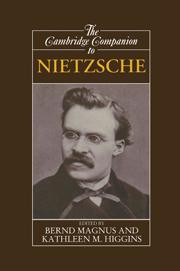Book contents
- Frontmatter
- Introduction to the Cambridge companion to Nietzsche
- Part I Introduction to Nietzsche's works
- Part II The use and abuse of Nietzsche's life and works
- Part III Nietzsche as philosopher
- Part IV Nietzsche's influence
- 9 Nietzsche in the twentieth century
- 10 Nietzsche's French legacy
- 11 Nietzsche and East Asian thought
- Selected bibliography
- Index
11 - Nietzsche and East Asian thought
Influences, impacts, and resonances
from Part IV - Nietzsche's influence
Published online by Cambridge University Press: 28 May 2006
- Frontmatter
- Introduction to the Cambridge companion to Nietzsche
- Part I Introduction to Nietzsche's works
- Part II The use and abuse of Nietzsche's life and works
- Part III Nietzsche as philosopher
- Part IV Nietzsche's influence
- 9 Nietzsche in the twentieth century
- 10 Nietzsche's French legacy
- 11 Nietzsche and East Asian thought
- Selected bibliography
- Index
Summary
I imagine future thinkers in whom European-American indefatigability is combined with the hundredfold-inherited contemplativeness of the Asians: such a combination will bring the riddle of the world to a solution. (1876)
The conjunction signified by the “and ” of the main title is to be taken in three ways. First of all the question of what influence, if any, ideas from Asian philosophies may have exerted on the development of Nietzsche's thinking. Conversely, there is the issue of the enormous impact Nietzsche's ideas have had in Asia and the enthusiasm with which he continues to be studied there today - especially in China and Japan. A subsidiary theme here concerns the ways his thought has been appropriated by those quite alien cultures and thereby transformed, as well as the relevance of such appropriations to Nietzsche scholarship in the West. And finally the field of comparative research, which embraces a variety of styles of discourse. A comparison of Nietzsche's ideas on a certain topic with those of an appropriate Asian philosophy can enhance our appreciation of both sides. For people familiar with Nietzsche, a comparison with an East-Asian thinker might serve as a way into hitherto unfamiliar modes of thought. And since Chinese and Japanese philosophies are for the most part immetaphysical in outlook, insofar as Nietzsche's ideas can be shown to resonate sympathetically with features of those quite alien traditions of thinking, such resonances may boost his standing in the competition, among such figures as Hegel and Heidegger, for the distinction of being the first Western thinker to “overcome” the metaphysical tradition.
- Type
- Chapter
- Information
- The Cambridge Companion to Nietzsche , pp. 356 - 384Publisher: Cambridge University PressPrint publication year: 1996
- 6
- Cited by

